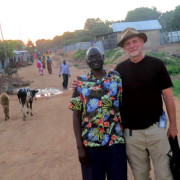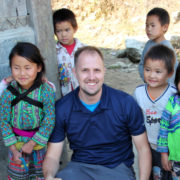Moments with missionaries: Kakuma, Kenya
Kakuma, Kenya
E. Allen Sorum
Kakuma is a development on the western edge of Kenya’s Great Rift Valley. Temperatures usually range up to 100 degrees by day and 75 degrees by night. It’s desert here. The wind blows, but it’s not cool or refreshing. Food doesn’t grow here. This land should be left to the snakes and scorpions that don’t know how miserable this place is.
But Kakuma is a human development, so to speak. The UN Refugee Agency reports that approximately 200,000 residents are jammed into this desert camp. One hundred thousand of these refugees are South Sudanese Nuer seeking asylum from the Dinka government in their homeland that seeks to exterminate them.
When new residents arrive in the camp, the family receives a piece of thick plastic that is 180 square feet. This will serve as their shelter, assuming the family can find sticks or some other means to support the tarp. The only food or water this family has access to is handed out irregularly by refugee support agencies. There is food on the black market, but there is no way to earn money to buy food. Extreme conditions breed anger and despair. Add uncertainty because the government of Kenya has announced plans to close their refugee camps as a security measure against the rising tide of terrorism.
Does this sound like an ideal spot in which to plant a church? Would it be wise to send a WELS missionary to live just outside this camp—for as long as it remains open—to preach the gospel?
Sounds absurd. Yet the gospel is needed in this place of despair—and people want it. Kakuma resident James Dobual is part of a group of South Sudanese refugees organized by WELS pastor and refugee to North America, Peter Bur, to start and to serve congregations in the refugee communities of Kenya and Ethiopia. Peter Bur and his team delivered a translation of Luther’s Catechism to the spiritual leaders of these refugee communities and taught it to them in the fall of 2015. In the fall of 2016, Peter Bur, Terry Schultz, and I returned to Kenya with more training and encouragement.
But James did a better job of encouraging us than we could ever do for him. He and his assistant Michael Tut reported that between our visits, they had taken 150 people from the camp in Kakuma all the way through the Catechism. On a given Sunday, almost 300 people gather to worship in a place that does not want to support human life. But James is preaching the Word of Life. He is proclaiming a message that refreshes weary souls. His church is thriving.
A cynical voice within wants to challenge these reports. That voice in me was silenced when I saw Michael pull out his copy of the catechism (pictured). He lifted it up to show me its wear. He held it like it was a treasure. He keeps it close because he is memorizing it. That catechism, Michael reported, changed him from a refugee camp resident into a Lutheran evangelist.
After our two-week training event in Nairobi, James and Michael went back to Kakuma. They were eager to get back to their people, to their thriving church. May God help them. And may God help us to help them.
E. Allen Sorum is the director of the Pastoral Studies Institute of Wisconsin Lutheran Seminary. He and Peter Bur are planning another trip to Kenya in October.
SUBMIT YOUR STORY
Do you have a manuscript, idea, or story from your own life you’d like to share for use in Forward in Christ or on wels.net? Use our online form to share it to our editorial office for consideration.
SUBSCRIBE TO FORWARD IN CHRIST
Get inspirational stories, spiritual help, and synod news from Forward in Christ every month. Print and digital subscriptions are available from Northwestern Publishing House.
Author: E. Allen Sorum
Volume 104, Number 6
Issue: June 2017
Copyrighted by WELS Forward in Christ © 2021
Forward in Christ grants permission for any original article (not a reprint) to be printed for use in a WELS church, school, or organization, provided that it is distributed free and indicate Forward in Christ as the source. Images may not be reproduced except in the context of its article. Contact us




